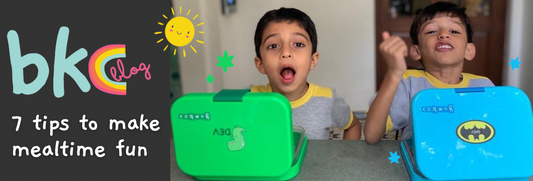If you are struggling with your child’s frequent bouts of infections, read on as Dr Kanika Sabharwal, a homeopathic doctor with an MD in Paediatrics, gives pointers on how to prevent and recover from them holistically.

‘Tis the season where kids fall sick often. Add a school reopening to the mix; it’s the perfect setting for bacterial and viral infection transmissions in children. It is often around this time the word ‘immunity’ gets thrown around a lot in parent conversations.
In this article, we speak to Dr Kanika Sabharwal, a homeopathic doctor with an MD in Paediatrics, about the different ways to build a strong immune system in children.
Q: What is an immune system? How do infections and diseases affect children differently?
Sabharwal: To put it simply, the immune system fights the infections in your child’s body. Every child is built differently; the same goes for different immune systems. It is a combination of factors – ranging from genetic make-up and physical build to immunity and reactivity to viruses – that decide how a child is affected by an acute infection and if at all.
This is why your little one catches an infection if another child in their classroom is unwell. Sometimes your child may not catch it even when multiple children are out sick.

Q: Can we prevent infections? If so, how can this be done?
Sabharwal: Some measures can be taken to help prevent respiratory, gastro-intestinal, and mosquito-borne infections in your little one:
-
Ensure the water your child drinks is clean and safe. If you don’t have an effective water purifier at home, boil the water for 5-10 minutes before consumption.
-
Wash fruits and vegetables thoroughly with water before food prep.
-
Make sure food is not left uncovered as there is a risk of contamination.
-
Avoid the presence of stagnant water in and around the house to prevent mosquito breeding. Check your potted plants and drains regularly to see if there is stagnant water.
-
Install mosquito nets on doors, windows, and beds. Apply repellent creams or sprays liberally on your child when leaving the house.
-
Include citrus fruits, nuts, raw turmeric, and yoghurt in your child’s daily meals.
-
Avoid sudden temperature changes. If your child has been outside in the sun, make sure they don’t go into an air-conditioned room or have chilled drinks right away.
“The best way to be on the recovery path: REST, HYDRATE, and EAT RIGHT.”
Q: You mentioned some foods in the above precautionary measures. What does food have to do with immunity?
Sabharwal: Nutrient means that which nourishes. There are two types of nutrients: macronutrients (carbohydrates, proteins, and fats) and micronutrients (vitamins and minerals). These help in growth and development of the body and provide energy for various functions. Each nutrient has a specific action and thus the need for a balanced diet that incorporates all.
Q: Even if you take precautions, some seasonal infections are inevitable. How can parents nurse their children back to health after a course of infection?
Sabharwal: The time and process of recovery depends on each individual. It’s important to not compare with other children, but to focus on understanding your child’s health status and work on that.
REST, HYDRATE, and EAT RIGHT: this is the best way to be on the recovery path. When your little one is recovering, it’s advisable to ease them back into their routine; first resume only school and then gradually go back to the full day of school, classes, playtime, etc.
Hydration is essential particularly when recovering from a viral infection to replenish the fluids lost. It also helps to liquify the mucus for relief.

Q: What are some foods that help with recovery? How are they helpful?
Sabharwal: There are many foods that boost recovery. These aim at reducing inflammation and adding protein.
-
Green leafy vegetables: Rich in Vitamin C and antioxidants
-
Berries: Contain antioxidants and Vitamin C; stimulate protein collagen
-
Nuts: Contain minerals and vitamins
-
Sweet potatoes: Healthy high carb source for energy
-
Salmon and eggs: Good source of protein
Q: Sometimes kids tend to stop food intake when they fall sick. Why is this?
Sabharwal: There are two important reasons for a sharp drop in appetite when your child is unwell: one is the release of certain chemicals (cytokines) that are a part of the inflammation process and the second is just to conserve energy.
Digesting food involves expending energy and the body tries to conserve that to fight the infection.
Respiratory and gastric ailments are the most commonly seen infections in children. Sore throat or stomach upset also contributes to the drop in appetite.
There is also a common practice to pump the child with milk to ensure ‘at least something goes in’. Please remember, milk makes the child full and will contribute to them eating less.
Q: Even for adults, gut health goes for a toss after an infection/disease. Kids especially have sensitive guts. What probiotic food helps the GI tract recover quickly?
Sabharwal: Prebiotics comes before probiotics. Prebiotics act as food for the gut bacteria that help with digestion. These include foods such as whole grains, bananas, greens, onions, garlic, soybeans, and artichokes.
On the other hand, probiotics are foods or supplements that contain live microorganisms intended to maintain or improve the "good" bacteria in the body. Probiotics are in foods such as yoghurt and sauerkraut.

Q: Now that we have discussed recovery from infections and diseases, how can we build immunity for a child’s long-term health? What foods can help with this?
Sabharwal: Immunity is built with a good balance of adequate hydration, a well-balanced nutritious diet, refreshing sleep, moderate exercise, and mental well-being (which includes ‘me’ time and playtime for children).
Specific foods to build immunity include flax seeds, berries, ginger, turmeric, yoghurt, dates, whole grains, dry fruits, and nuts. I often recommend parents to incorporate flax seeds, dried figs, and dates into their children’s meals.

Q: With an intake of immunity-building foods, will benefits be seen sooner? If so, what are they? If not, how can parents supplement their child’s nutritional needs?
Sabharwal: With regular intake of immunity building foods, episodes of acute infections will reduce over time and recovery during episodes will be faster.
If your child has a drop in energy levels or weight, isn’t eating well, or you notice any other changes, it is advisable to consult your doctor to check for any deficiencies and supplements should be added only thereafter.
About Dr Kanika

Dr Kanika Sabharwal is currently an assistant professor at the Department of Obstetrics & Gynaecology at Smt Chandaben Mohanbhai Patel Homeopathic Medical College, Mumbai. Practising since the past seven years, she specialises in women and child healthcare with a holistic approach emphasising on non-pharmacological therapies.
She has published articles based on her research in paediatric topics including allergic rhinitis and autism. She has also conducted seminars on allergies and fever among children.





